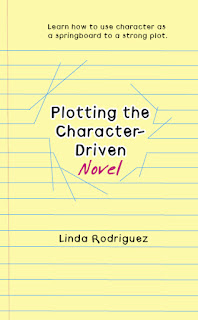Book Excerpt-To Find Time to Write Your Novel, You Must Make Time to Write
 This is an excerpt from my new book on writing, Plotting the Character-Driven Novel.
This is an excerpt from my new book on writing, Plotting the Character-Driven Novel.
https://www.amazon.com/Plotting-Character-driven-Novel-Linda-Rodriguez/dp/097912915X
I wanted to give you a taste of what it’s like. As I explain on the very first page: “Writing a novel
requires several things—time, motivation, the willingness to keep
learning the craft of fiction, and an ability or process to access
your creative thoughts. We’ll deal with the first two in this
chapter briefly since they’re mostly beyond the purview of this
book, and the rest of the book will concern itself with elements of
the craft of fiction and a process for accessing your own inner
knowledge of your novel by freewriting, brainstorming by yourself,
and thinking on paper. I will be including samples of actual work
documents I have used with this process to create published novels in
order to give you examples of how these techniques and tools work—and
also to show that behind those perfect books you pick up at the
bookstore lies a great deal of hard work, messy process, and flailing
around. This book is designed to help you keep the flailing around to
the minimum.”
So, this is from the first section of the book.
do you find time to write the novels which are your vocation in the
midst of job and career demands, family and housework demands,
community and societal demands? When everyone else expects so much
from you that there’s nothing left for your own dreams, what can
you do about it?
we have to change our terminology from “finding time to write” to
“making time to write.” The sad truth is that no one finds time
to write. There aren’t big pockets of time just lying around
waiting to be picked up and used in most of our lives. For most of
us, we’ll have to give up some comfort or pleasure to make real
time to write—in some cases, to make any bits of time to write at
all.
first step is to make the decision to own your own life. Time is not
a commodity–the time we’re talking about is the substance of your
life. When it’s gone, so are you. If you want to write anything,
you have to claim your own life and find out what you want.
do you find those pieces of time and the regular schedule for writing
that leads to a body of work? The trick is to create order and make a
tourniquet for a time hemorrhage, but first you must destroy all of
those ‘shoulds’ and ‘what will people thinks’ that are standing in
your way. Make it easy on yourself by asking for help and accepting
help when it’s offered to you. Take the time to de-stress. When
you’re not frazzled by stress, you’ll find it easier to set
limits and boundaries and hold to them.
you find your desk or day becoming chaotic, take time to reorganize.
It will repay in more time that you can steal for your illicit love
affair with the novel. To make sure you stay on track with those
things that absolutely must be done, make a brief list of the way
your time was spent at the end of each day and week. Check it for
places where you abandoned time reserved for writing or other truly
necessary tasks to engage with lower priority urgencies or comfort
activities. After a disastrous day, sit down with a notebook and
figure out how to handle things differently if you face the same
situations again. Review the situation and just what happened step by
step, pinpointing the spot(s) at which you could and should have made
a different decision or taken a stand against someone else’s urgency
with your time. Figure out a strategy for dealing with this situation
when it next arises, and write it down. Then forget the day and
relax.
about the myriad things, some great but most small to tiny, that we
must take care of wears us down. When you find yourself doing this
rather than being able to write or revise the passage you want to
work on, keep an ongoing master list and write down each task or
obligation the moment you think about it. Get it out of your head and
onto paper to free your mind and stop the energy drain. Then, later,
you can decide which tasks can be delegated to someone else and
arrange the remaining tasks in the order that will allow them to be
done quickest and most easily.
can also free up energy by developing habits and systems to take care
of the mindless stuff. We already do this every day, brushing teeth,
driving to work, without having to make decisions for each tiny
action that comprises these tasks. Develop a system for handling
things that recur, and stick with it for twenty-one days. Then it
will be a habit, and you can forget it and set your mind free to be
more creative.
time use is sheer habit. Work smarter. Find the ways in which you
want and need to spend time. Steal those minutes and hours from
low-priority tasks. Break down everything on your to-do list into
small tasks and estimate the minimum time to accomplish them. (Double
all time estimates!) Schedule into your calendar. If they won’t all
fit in the time allotted, then something must go. Nothing is fixed in
stone–renegotiate and eliminate whatever you can. Of the rest, what
can you successfully delegate? It pays to invest time (and money, if
possible) in training someone to do it.
assertive. Don’t be afraid to approach someone with a request, and
don’t take it personally if they refuse you. Learn to say ‘no’
kindly and firmly and to receive a ‘no’ without letting it affect
your self-esteem or your relationship. Be secure.
of many published novels and teacher of writing, Holly Lisle, says it
the best way I’ve ever seen it. “Realize that real writers who
write multiple books and who make a living at it have systems they
use. A process for brainstorming, a consistent way of outlining a
story, a certain number of words or pages a day, a way of plotting, a
way of revising, a way of finishing. Writing is work. It doesn’t fall
out of your head by magic. It doesn’t just happen because you want it
to.”
Character-Driven Novel is based on her popular workshop. Every
Family Doubt, her fourth mystery featuring Cherokee campus police
chief, Skeet Bannion, will appear in June, 2017. Her three earlier
Skeet novels—Every Hidden Fear, Every Broken Trust,
and Every Last Secret—and
her books of poetry—Skin Hunger
and Heart’s Migration—have
received critical recognition and awards, such as Malice
Domestic Best First Novel, International Latino Book Award, Latina
Book Club Best Book of 2014, Midwest Voices & Visions, Elvira
Cordero Cisneros Award, Thorpe Menn Award, and Ragdale and Macondo
fellowships. Her short story, “The Good Neighbor,”
published in the anthology, Kansas City Noir, has been
optioned for film.



